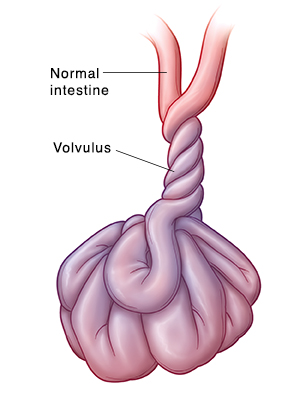When Your Child Has a Volvulus
A volvulus is when the bowel (intestine) twists in a way it’s not supposed to. The twist can cut off blood flow to part of the intestine. The part of the intestine not getting blood can die. This can cause serious digestive problems. A volvulus can even be fatal. Most often, a volvulus occurs in children younger than 1 year of age.
 |
| A volvulus happens when part of the intestine becomes twisted and cuts off its blood supply. |
What causes a volvulus?
Volvulus often occurs in children with intestinal malrotation. This is a problem in which the intestine twists and turns the wrong way inside the belly (abdomen). A volvulus can also be caused by infection or blockage in the intestine. In some cases, a volvulus occurs for unknown reasons.
What are the symptoms?
Symptoms of a volvulus are often sudden and severe. They can include:
How is a volvulus treated?
A volvulus must be treated right away with emergency surgery. During surgery:
-
The intestine is carefully untwisted.
-
If a part of the intestine has died due to lack of blood flow, it must be removed. The healthy ends of the intestine are reattached.
-
If a long length of intestine is removed, a small opening (stoma) may need to be made in your child’s abdomen. This gives a new way for waste to leave the body. If your child needs a stoma, the healthcare provider will tell you more.
What are the long-term concerns?
If a volvulus is found and treated, your child will likely do well. But you should watch for signs of volvulus in the future. If a long portion of intestine must be removed during surgery, your child may have lifelong digestive problems, such as short bowel syndrome. Your child may also be at risk for small bowel obstruction in the future. Talk with your child’s healthcare provider for more information about your child’s outcome.
© 2000-2024 The StayWell Company, LLC. All rights reserved. This information is not intended as a substitute for professional medical care. Always follow your healthcare professional's instructions.